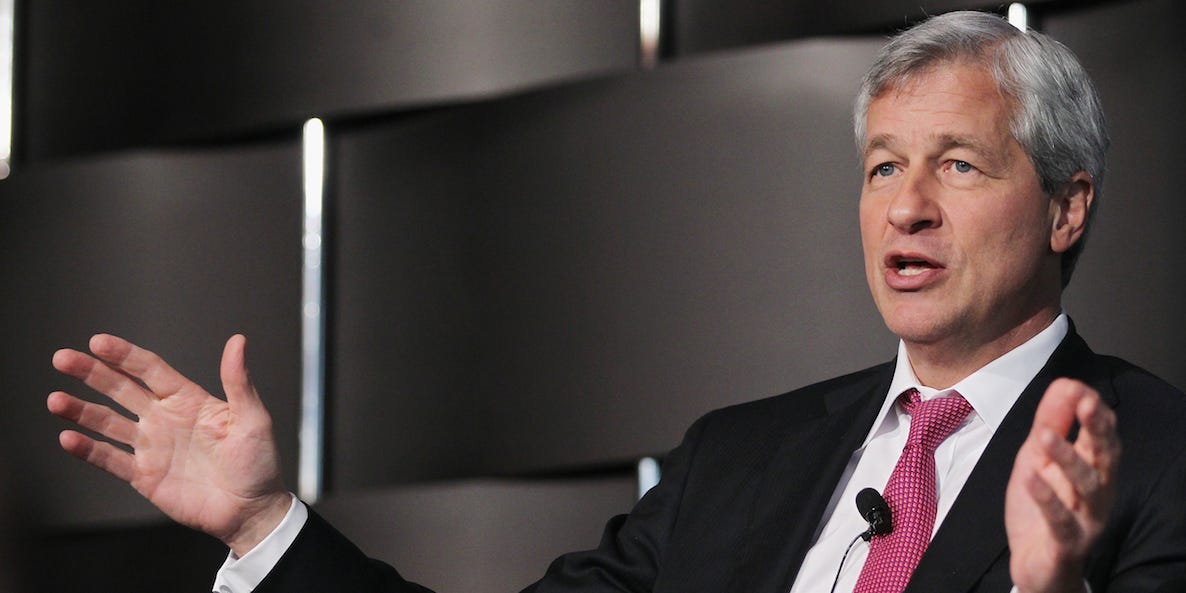Jamie Dimon, David Solomon, and Ray Dalio warned of a cash crunch this week. Dimon and Solomon flagged the risk of a US recession and a slump in consumer spending. Dalio underlined how rising interest rates could squeeze cash-strapped, debt-ridden governments. Loading Something is loading.
Thanks for signing up!
Access your favorite topics in a personalized feed while you’re on the go.
Jamie Dimon, David Solomon, and Ray Dalio have sounded the alarm on a cash crunch, a looming US recession, and the Russia-Ukraine conflict.
The three Wall Street legends spoke at the Future Investment Initiative in Saudi Arabia on Tuesday. Here are the highlights.
Jamie Dimon, CEO of JPMorganDimon said the US economy remains healthy, but it faces several near-term headwinds that could tip it into a recession.
The JPMorgan chief cautioned that households — which are being squeezed by rising prices, mortgage costs, and credit-card payments — are likely to exhaust their savings by the summer.
“American consumers — eventually the excess money they have is running out,” he said. “That will probably happen sometime mid-year.”
However, Dimon emphasized the Russia-Ukraine conflict is far more worrying. The invasion shattered the illusion of global peace, and has exacerbated US-China tensions and other geopolitical concerns, he said.
“The relationships of the Western world — that would have me far more concerned than whether there’s a mild or slightly severe recession,” Dimon said.
The bank boss added that Russian President Vladimir Putin’s threats of nuclear war have raised the prospect of catastrophic fallout.
“This nuclear blackmail is probably the worst thing that we’ve seen in our lifetimes,” he said.
David Solomon, CEO of Goldman SachsSolomon underscored how difficult it will be for the Federal Reserve to curb soaring prices without choking growth.
“Generally, when you find yourself in an economic scenario like this, where inflation is embedded, it’s very hard to get out of it without a real economic slowdown,” he said. “The US is most likely going to have a recession.”
The Goldman chief said he expects the Fed to continue hiking rates to 4.5%, from a range of 3% to 3.25% today, then pause to see whether the inflation threat recedes. If aggregate demand remains strong and the labor market doesn’t soften, officials at the US central bank could lift rates even higher, he suggested.
“If they don’t see real changes in behavior, my guess is they’ll go further,” he said.
Solomon pointed out that between the 1980s and the spring of this year, the Fed kept rates low, scooped up government bonds, and didn’t worry about inflation. A sudden tightening of its monetary policy was always going to be jarring, he said.
“We’re now in the process of unwinding a multi-decade period, and there are consequences to that,” he added.
Ray Dalio, founder of Bridgewater AssociatesDalio outlined how cash-strapped governments loaded up on debt while money was cheap and plentiful, but now rising rates are increasing their borrowing costs and threatening to plunge them into fiscal crises.
“Now an interest rate that is high enough to deal with inflation, and also high enough to provide an adequate return for the bond investor, is too high of an interest rate for the debtor,” he said.
The Bridgewater founder described Britain’s recent market meltdown as a “canary in the coal mine.” That suggests he expects other countries to try fighting inflation with higher rates, while also shoring up growth through debt-funded spending. However, the UK’s experience shows that approach can spook investors, spark liquidity and leverage issues, and spur emergency interventions from central banks.
Dalio also touched on how a US recession could materialize. He predicted higher yields on super-safe government bonds would sap demand for riskier assets such as junk bonds. Moreover, tighter financial conditions would leave consumers, companies, and other entities short of cash within the next few years, he said.
A flight to haven assets, coupled with a liquidity crunch, would likely drag down financial markets and weaken economic growth.
“The dominoes are falling in a very classic way,” Dalio said.
